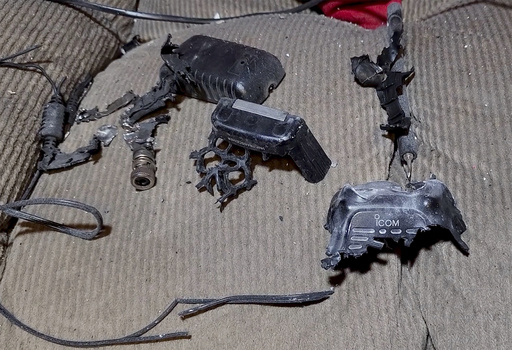WASHINGTON — Two former senior Israeli intelligence officials unveiled insights into a covert, high-stakes operation targeting Hezbollah fighters in Lebanon and Syria. This strategic initiative, meticulously years in the making, revolved around using walkie-talkies and pagers rigged with explosives and erupted into action three months ago. The tensions escalated dramatically when Hezbollah began launching attacks on Israel following Hamas’ assault on October 7, 2023, which ignited the ongoing conflict.
In an exclusive interview with CBS “60 Minutes,” aired recently, the agents, who concealed their identities with masks and altered voices, shed light on the complex maneuvers behind the operation. One agent, identified only as “Michael,” revealed that the groundwork was laid a decade ago, during which Hezbollah, unaware of the true source, purchased walkie-talkies that were enhanced with explosives. The actual activation of these devices occurred in September, shortly after several booby-trapped pagers exploded.
According to Michael, “We created a pretend world” to facilitate the operation. The follow-up phase of the plan commenced in 2022, when Israel’s Mossad uncovered Hezbollah’s acquisition of pagers from a Taiwan-based supplier. The pagers were custom-designed to accommodate the concealed explosives, undergoing multiple tests on dummies to ensure that they would inflict injury only on the intended target and spare those nearby.
The second agent, referred to as “Gabriel,” explained how they lured Hezbollah into adopting the modified pagers. Misleading advertisements were circulated on platforms like YouTube, touting features like durability and extended battery life. Gabriel described the use of shell companies, including one situated in Hungary, to mislead the Taiwanese manufacturer, Gold Apollo, into unknowingly collaborating with Mossad. This elaborate deception rendered Hezbollah completely unaware of its dealings with Israel.
Gabriel likened the elaborate disguise to a psychological film from 1998, in which an unsuspecting man lives in a fabricated reality surrounded by actors maintaining the facade. He stated, “When they are buying from us, they have zero clue that they are buying from the Mossad. We create a controlled environment, and their experience seems completely normal.”
By September, Hezbollah fighters had unwittingly amassed around 5,000 pagers, which were activated on September 17, causing a widespread detonation across Lebanon. The devices exploded regardless of whether the user attempted to read incoming messages. The following day saw the activation of the walkie-talkies, which detonated, tragically resulting in fatalities at funeral gatherings for some of the approximately 30 individuals lost during the pager explosions.
The objective, according to Gabriel, extended beyond merely eliminating Hezbollah operatives to instilling a deeper sense of vulnerability within the organization. “If someone is simply dead, they are dead. However, if they are injured and need medical attention, that demands resources and investment,” he explained. Wounded personnel would serve as enduring evidence of Israel’s dominance throughout the Middle East.
In the aftermath of the explosives deployment, Israel’s air force targeted various locations across Lebanon, leading to significant casualties. Hezbollah’s chief, Hassan Nasrallah, was reportedly killed when Israeli bombs struck his bunker. By November, hostilities between Israel and Hezbollah reached a ceasefire, a development influenced by the earlier violent acts initiated by Hamas on October 7, 2023, which resulted in the tragic deaths of over 45,000 Palestinians during the Gaza conflict.
Michael articulated that in the wake of the explosions, a palpable fear gripped the population in Lebanon, with individuals hesitating to activate air conditioning units due to fears of potential hidden explosives. “There is real fear,” he confirmed. When inquired if this atmosphere of fear was deliberate, he replied, “We want them to feel vulnerable, which they are. We’ve moved past the use of pagers and onto the next phase, leaving them guessing about what might come next.”


